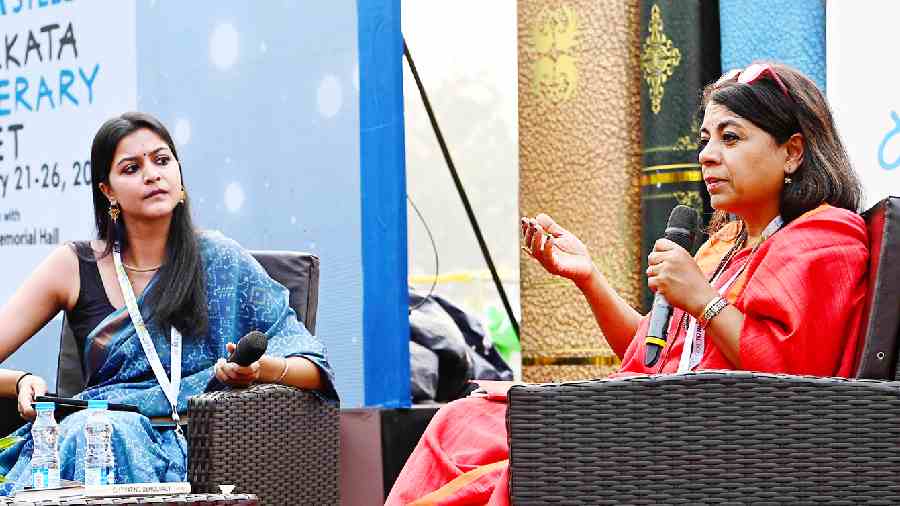Like a good harvest, democracy needs cultivation, which involves vigilance. The lack of it erodes democracy, as is the case with India.
A session between a veteran and a budding anthropologist at the Tata Steel Kolkata Literary Meet, in association with the Victoria Memorial Hall and The Telegraph, offered a succinct peek into India’s democracy through the lens of its villages and farmers.
Mukulika Banerjee, associate professor in social anthropology at the London School of Economics, discussed her latest book, Cultivating Democracy: Politics and Citizenship in Agrarian India, with Ahona Palchoudhuri, a PhD candidate in the anthropology department at Brown University, US.
The book is an ethnographic analysis of the relationship between rural citizens and politics and elections. Banerjee draws from time spent with the people in two Bengal villages from 1998 to 2013, during election campaigns and in the times between.
Palchoudhuri began, in her own words, in the most “hackneyed” way possible in a literature festival, with the title of the new book and asked about the “limits of democracy as a form of life”.
Banerjee, whose previous books include Why India Votes? and The Pathan Unarmed, compared democracy with agriculture.
“Cultivating democracy works at two registers. The word cultivation is literal because I am writing about paddy farmers in the Birbhum district in Bengal. The second meaning is what is the opposite of cultivation. To my mind, it is complacency. The reason I have called it cultivating democracy is because of the global democratic backslide we see at the moment. This is happening in India very seriously.
“The major reason is that we all got very complacent. When the postcolonial world gained independence and set up its democracies and its institutions, we forgot that these institutions are really half the story of democracy. To make sure they are robust, they remain impartial, requires constant vigilance, which is a very important part of cultivation. Today in India, what we have is a very distorted form of democracy. It is really the result of complacency. Because we did not ask questions. We did not push back,” said Banerjee.
Towards the end of the session, talking of the marathon protest by farmers on the borders of Delhi, Banerjee reiterated the comparison.
“Journalists kept landing up and asking how were the farmers still sitting there (during the cruel Delhi winter). They said we are farmers. We are used to this. You can't grow anything on the fields if you worry about the weather. Resistance and resilience of this kind, in order to carefully, patiently fight for and look after something, is what a farmer teaches you,” she said.
“There were libraries and big langars. The idea of the langar was to create a common good that everybody could be a part of. It was this idea of republic without which we don't have a democracy. Without the republic, there is no democracy, ”she said.
“If you want to study elections and democracy, you have to be there where there are no elections. What happens in ordinary life in between elections is what determines what will happen during the elections,” Banerjee said.
It was this time (between two elections) that made her realise that an election was a sacrosanct moment for rural people. Most women she met in the villages had three saris. One they wore and another they washed. The third one, a cotton handwoven sari, was the most prized, only meant for weddings, festivals and for wearing to the polling booth, said Banerjee.
The same time also led Banerjee to an understanding of how religion created an egalitarian moral economy, the kind that the Right-wing targets.
She spoke of a qurbani at a Muslim-dominated village, where 11 animals were sacrificed. But everyone in the village, including the doms and bagdis, ate meat that day.
“Everybody was sent some. There is no refrigeration. You cannot make it last very long. You ate a little bit and distributed the rest. You enjoy that little bit of meat more if everybody got some,” said Banerjee. This was a village so poor that most people ate red meat only once a year and daily food meant rice, dal and occasional vegetables.
“Now, where religious politics is going and I am very aware that this is West Bengal, where the BJP comes knocking on the door so loudly.... This is the kind of moral economy that the Right-wing Hindu majoritarianism attacks. Suddenly my dom and bagdi friends were saying ‘we don't eat meat, we are Hindus’. These are the kinds of fissures that open up,” she said.
